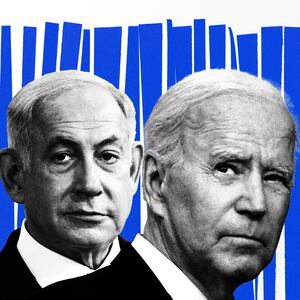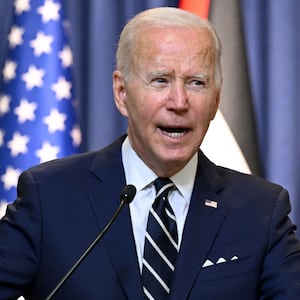The United States is pushing forward to hammer out a deal with two of the world’s least trustworthy leaders. What could go wrong?
According to a Wednesday report in The Wall Street Journal, the U.S. has been actively working to hammer out an agreement by which Saudi Arabia recognizes Israel. This would certainly be a major diplomatic breakthrough for the region. That said, the White House denied the element of the Journal’s story that said a framework had been reached with the Saudis on the deal.
Even so, it is well known that the U.S. has been working with both sides to explore and advance such a deal. That fact alone raises bigger questions: Why? Who will benefit? Who can we trust?
It is easy to see what is in this for the Israelis. Prime Minister Benjamin Netanyahu, facing massive political unrest at home due to his ongoing efforts to gut his country’s independent judiciary—as well as the inflammatory anti-Palestinian actions and rhetoric from the most extreme right-wing members of his coalition—would get to play the statesman and manufacture the kind of distraction he needs from his daily crises. Indeed, even talk of this deal helps him.
The Saudis would reportedly get security guarantees from the U.S., which matter greatly to them as Iran ramps up its nuclear capabilities. They’d also receive assistance with civil nuclear programs, and they’d get some kind of assurances regarding the eventual creation of a Palestinian state. While this last matter is almost certainly the least important to the Saudis substantively, it is vitally important optically, and it seems the one area in which such a deal is most likely to blow up.
Of course, the fact that Saudi Crown Prince Mohammed bin Salman’s relations with the Biden administration have ranged between frosty and worse—in large part because he stiffed the U.S. after assuring he’d help tamp down on the price of oil, as well as on expected support for Ukraine early in that crisis—puts another cloud over the prospects for striking such a deal and having it hold.
On the Palestinian issue, the situation has been rapidly deteriorating since the latest Netanyahu government came into existence. Violence in Jerusalem and the brutal IDF incursion into Jenin have been accompanied by more scattered violence, actions by extremist Israeli “settlers” against Palestinians, and vile rhetoric from members of the Netanyahu government. (Example: The former terrorist and current Israeli National Security Minister Itamar Ben-Gvir called Israelis who were suspected of murdering Palestinians “heroes.”)

Israeli Prime Minister Benjamin Netanyahu attends the weekly cabinet meeting in the prime minister's office in Jerusalem, Israel on July 30, 2023.
ABIR SULTAN/Pool via REUTERS/File PhotoOne reason given for the push to get a deal, according to the Journal article, is that “the Biden administration is trying to secure assurances from Saudi Arabia that it will distance itself—economically and militarily—from China.”
How such assurances are structured is sure to be tricky. It would be folly to expect the Saudis would, in any real way, give up the economic benefits of a relationship with China. Just as importantly, they’d be unlikely to forfeit the leverage over Washington that they’d gain by merely having the possibility of such a relationship.
Perhaps short-term promises not to allow China to build a military base in Saudi Arabia could be hammered out, but a big question would be how long such promises would last the next time Washington and Riyadh end up at loggerheads.
In short, achieving such a deal would be highly complex, getting elements of it approved in the fraught political environments in Israel and the U.S. would be difficult (the Saudi monarchy doesn’t face such obstacles). Implementing and keeping the deal would be profoundly challenging. China, Russia, Iran, and a host of their allies would likely make getting to or maintaining such a deal difficult. Any further shift to the right in Israel could be a deal killer. Future energy crunches could be, too.
What is more to each of the parties, the deal is about something other than what they say it is.
For the Saudis and the Israelis the deal is less about rapprochement and more about Iran. For the U.S. it is more about China. For MBS and Netanyahu it is also about the pleasure of having the U.S. want something from them so much that Washington seems willing to set aside, at least for the moment, the recent ugliness in their respective relationships.
Candidly, and I say this as one who is broadly supportive of the Biden administration’s foreign policy (often enthusiastically supportive), I don’t understand the push to achieve this deal. It would be fragile, at best, and a formula for failure, at worst. It depends too much on hugely undependable people and countries. The benefits to the U.S. would likely be less than meets the eye following whatever the hoopla involved with the deal signing was.
Yes, if going for such a deal could lead to concrete and irreversible progress toward the creation of a truly independent Palestinian state, that would be a major achievement. If it could lead to an open and flourishing relationship between Israel and Saudi that would not be buffeted by the active objections of significant factions in both countries, that would be of historical significance. If it all might lead Iran to reconsider the merits of seeking to be a nuclear power given the unified opposition of virtually every country in the region, that would be of great benefit to world peace and security.
The problem is each of those things is among the longest of longshots—and that is being charitable. So why do it?
Former U.S. Ambassador to Israel Martin Indyk has some ideas. He begins by describing a dilemma facing President Biden. He says, “If (Biden) does the deal with Bibi’s current coalition he gives a turbo boost to the ultra-nationalists who want to curb the judiciary AND annex the West Bank. But if he turns his back on the opportunity to make peace between Saudi Arabia and Israel, when MBS is saying that he’s ready (for a price in U.S. dollars), then he looks like he’s not interested in Middle East peace (in contrast to Trump’s Abraham Accords).”

Saudi Crown Prince Mohammed bin Salman fist bumps U.S. President Joe Biden upon his arrival at Al Salman Palace, in Jeddah, Saudi Arabia, July 15, 2022.
BANDAR ALGALOUD/ReutersHow is the dilemma resolved?
Indyk suggests what could be a clever strategy that may appear to be seeking a deal but is actually advancing other goals: “The only way to resolve the dilemma is to insist on a meaningful Palestinian component that stops the annexation efforts of the current Israeli government which are now proceeding apace. Biden needs that more than MBS, to secure support from Democrats in Congress, and to prevent the deal from blowing up down the road when Palestinian despair and Israeli ambitions produce an explosion.”
But, Indyk adds, “the only meaningful deal is one that Bibi’s crazy partners cannot live with. So he’ll have to blow up his coalition and join with Gantz and Lapid to meet Biden’s requirements. A good outcome, no doubt.”
He concludes, soundly in my view, “To predicate your policy on a change in government in Israel and an unreliable Saudi partner who has told Biden and Bibi that he doesn’t care about the Palestinians is a complicated maneuver that’s more likely to fail than succeed. And that’s before you get to the nuclear deal and the NATO-like Article 5 security guarantee that MBS is insisting upon.”
Seeking to reverse lifetimes of enmity and to promote peace and U.S. national interests is always worthwhile. But yellow caution lights are flashing in this case.
Go slowly. Be skeptical. Seek belts and suspenders with every assurance.
And get what you can out of the deal early because there is a good chance it will not hold for long.
Finally, speaking of dilemmas, my Dad, an experimental psychologist, used to like to tell the story of the dilemma of Buridan’s ass. It’s the tale of a donkey who is placed between two equally appetizing piles of hay and, because he can’t make up his mind which to choose, starves to death.
I would say this case presents a Peanuts twist on that situation in which Charlie Brown (the U.S.) is placed equidistant between two Lucies (Bibi and MBS), each holding an equally tempting football for him to try to kick. Except in this case, inaction might be the only possible way to avoid an unhappy outcome.










